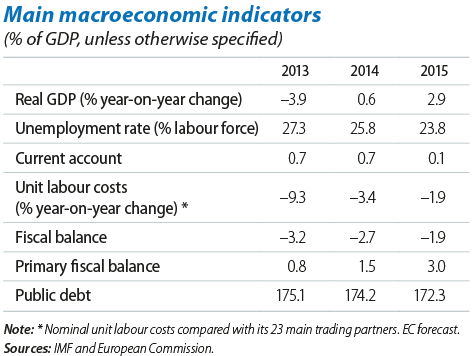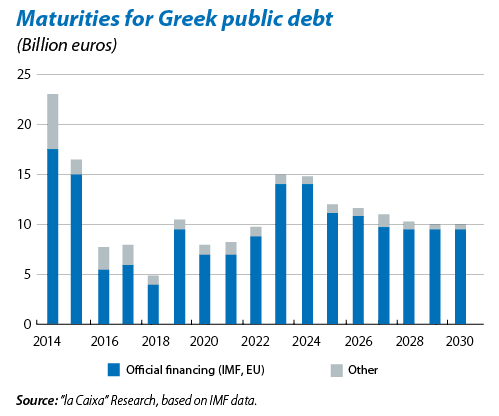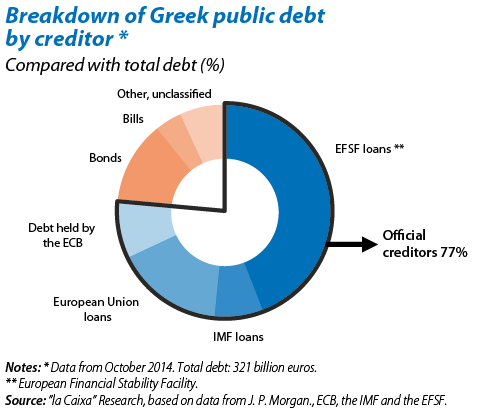Since the start of the crisis in 2008, Greece's GDP had shrunk by 27%. This slump came to an end in mid-2014 when the economy started to grow again, a rise that the IMF expects to consolidate this year with 2.9% annual growth. The continuation of macroeconomic imbalances forged before the crisis forced the country to carry out far-reaching measures in different areas: from adjustments in its public accounts (the primary budget balance went from –10.5% of GDP in 2009 to a surplus of 0.8% in 2013) to gains in competitiveness (unit labour costs1 have fallen by 14.3% since 2007), including corrections in external imbalances (the current account balance went from –11.2% of GDP to 0.7%). In spite of this progress, the country's huge economic depression pushed unemployment up to a peak of 27.8%.

The high level of public debt is still the main cause for concern as it is difficult to sustain. Although public debt reached 175% of GDP in 2013, close to 80% is held by official creditors (the IMF, EFSF and ECB) under advantageous terms. Firstly, in spite of the country's high levels of debt, its financing costs are relatively low. For example, the interest paid on the debt was 4.3% of GDP2 in 2014 but this cost was effectively 2.7% as the ECB returns any interest it receives on Greek debt to the country's Treasury. By way of comparison, the cost of Italy's debt is 4.7% of GDP and in Spain it is 3.3%, although both countries have a much lower level of public debt than Greece. Also, Greek debt has a long maturity, on average 16.5 years, far longer than the 6.3 years for Spanish public debt. In fact, most of the loans provided by official organisations do not need to be paid back until after 2023.

The new government therefore faces an extremely delicate economic and social situation, with significant repayments this year but favourable prospects in the medium term. The Greek economy started to grow three quarters ago and its aid programme agreed with the Troika offers financial terms that can help it to continue taking measures to ensure a long-lasting reduction in unemployment and sustained growth in the medium and long term.

Recommended Content
Editors’ Picks
EUR/USD clings to gains above 1.0750 after US data

EUR/USD manages to hold in positive territory above 1.0750 despite retreating from the fresh multi-week high it set above 1.0800 earlier in the day. The US Dollar struggles to find demand following the weaker-than-expected NFP data.
GBP/USD declines below 1.2550 following NFP-inspired upsurge

GBP/USD struggles to preserve its bullish momentum and trades below 1.2550 in the American session. Earlier in the day, the disappointing April jobs report from the US triggered a USD selloff and allowed the pair to reach multi-week highs above 1.2600.
Gold struggles to hold above $2,300 despite falling US yields

Gold stays on the back foot below $2,300 in the American session on Friday. The benchmark 10-year US Treasury bond yield stays in negative territory below 4.6% after weak US data but the improving risk mood doesn't allow XAU/USD to gain traction.
Bitcoin Weekly Forecast: Should you buy BTC here? Premium

Bitcoin (BTC) price shows signs of a potential reversal but lacks confirmation, which has divided the investor community into two – those who are buying the dips and those who are expecting a further correction.
Week ahead – BoE and RBA decisions headline a calm week

Bank of England meets on Thursday, unlikely to signal rate cuts. Reserve Bank of Australia could maintain a higher-for-longer stance. Elsewhere, Bank of Japan releases summary of opinions.